Four out of five of the I-TECH Ethiopia supported laboratories were the best performing among the 21 enrolled in the second phase of a program to test lab performance.
Author: itechadmin
Latest News from I-TECH Ethiopia
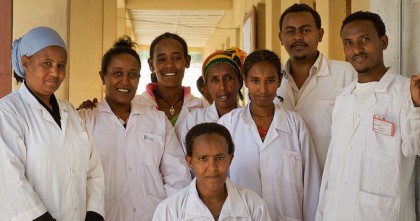
Overview of I-TECH Ethiopia
Since 2003, I-TECH Ethiopia has been working with the Federal Ministry of Health, Federal HIV/AID Program Coordinating Office, Regional Health Bureaus, civil society and other partners to provide technical assistance to support the knowledge, capacity, and skills of health care workers and improve Ethiopia’s health care systems.
I-TECH works primarily in the three northern regions of the country, Afar, Amhara, and Tigray, to support comprehensive HIV and AIDS programs and health systems strengthening in 60 health facilities (36 hospitals and 24 health centers) plus four regional laboratories. Together, these regions account for nearly 40% of the national HIV burden. Originally, I-TECH’s work focused on increasing access to HIV treatment and care, and on preparing health care workers to face the challenges associated with the epidemic. Increasingly, I-TECH is expanding this work to focus on a wide-reaching portfolio of health programs. These efforts are designed for sustainable transition to local ownership — allowing them to become an enduring part of the national health care system.
Updates
Integration of Mental Health and HIV Services
People living with HIV (PLHIV) are at higher risk for mental health problems which affects their health and quality of life. Mental health problems are more than twice as common among PLHIV then the general population. This may be even higher in communities where stigma and discrimination are rampant. In addition mental health services are limited in Ethiopia.
I-TECH Ethiopia has been strengthening the national mental health integration initiative. Specifically, in collaboration with the Ethiopian Regional Health Bureaus in Amhara, and Tigray and the Regional Networks of HIV Positive People, I-TECH initiated a pilot project for mental health integration through screening and management of common mental health conditions by using a task shifting approach since December 2012. ART clinicians and case managers have been trained on screening for mental health condition using a pre-tested simple screening tool adapted by I-TECH at four hospitals in Amhara and Tigray regions. The goal of the project is not only to provide comprehensive health services to PLHIV but to also improve adherence to care and treatment.
Debra Brehan Referral Lab Launch
The Debra Brehan Referral Hospital Laboratory was inaugurated on Sunday, June 16th by the US Ambassador to Ethiopia, Ambassador Donald Booth; Ethiopian State Minister, Dr. Amir Aman and Amhara National Regional State Vice President and Educational Bureau Head, Binalf Andualem. The laboratory was renovated and equipped by I-TECH Ethiopia with funds from the US government and the President’s Emergency Plan for AIDS Relief (PEPFAR) as well through partnership with the Amhara Regional Health Bureau and the Debra Brehan Hospital.
The laboratory was built to international standards to provide high quality laboratory tests and services to the Debra Brehan Referral Hospital and can service 450 patients per day. It provides referral testing services to 3 rural hospitals and 86 health centers in the region. The laboratory is equipped to perform different lab test such as microbiology, parasitology, blood culture, TB diagnosis, HIV testing as well as clinical care test for HIV positive patients such as blood chemistry, hematology and CD4 cell count for monitoring antiretroviral therapy. The laboratory will also serve as a sub regional referral laboratory for providing external quality assessments of other laboratories in the region.
In addition to this, this laboratory will also serve the region as a training site for the laboratory staff practicing in hospitals and health centers as well as for university students studying laboratory medicine.
Improvements to Blood Safety in Ethiopia
Blood safety ensures that everyone has access to blood and blood products that are safe, available, accessible and adequate to meet the needs of patients, transfused only when necessary, and provided as part of a sustainable blood program within the existing health care system. In Ethiopia the responsibility to meet the blood needs falls on the National Blood Transfusion Service (NBTS) and hospitals. A lot of blood is collected at transfusion hospitals, which are outside of the NBTS. Safe amount of blood supplies are inadequate in the transfusion hospitals to meet the health burdens of the Ethiopian society. This unmet need for blood has created a gap that is unregulated and fragmented. It has resulted in commercial collections and family replacement donations, which are of increased risk of transfusion transmissible infections.
I-TECH Ethiopia has been working to strengthen the national blood safety program in Ethiopia in collaboration with the Federal Ministry of Health. Most recently I-TECH supported training on blood donation and quality assurance for laboratories for blood safety. As well I-TECH supported training for community members to encourage volunteers for blood donation.
I-TECH will continue to work with the Amhara, Afar the Tigray Regional Health Bureaus to improve the health system to ensure a safe blood supply to the hospitals.
Malawi Bishop Promotes Male Circumcision
Right Reverend Bishop Emmanuel Fanuel Magangani of the Anglican Diocese of Northern Malawi is the first prominent church leader to announce that he was recently circumcised as part of the country’s efforts to promote Voluntary Medical Male Circumcision (VMMC).
Five Questions For Misti McDowell, I-TECH Ethiopia Country Director
Editor’s Note: This is a first in an occasional series featuring I-TECH staff.
Misti McDowell joined I-TECH Ethiopia in February, assuming leadership of I-TECH’s largest country program. In Ethiopia, I-TECH’s work is primarily in the Amhara, Afar, and Tigray regions, which account for nearly 50% of the national HIV burden. I-TECH is focused on strengthening the country’s public health systems, including hospitals and health centers, laboratories, public universities and medical schools. Prior to joining I-TECH, McDowell worked for five years in Dhaka, Bangladesh, for FHI360 where she oversaw projects on HIV/AIDS, nutrition, family planning, TB, hospital accreditation, and neglected tropical diseases.
 You just became the Country Director for I-TECH Ethiopia. What has been the biggest surprise in your first few weeks at I-TECH?
You just became the Country Director for I-TECH Ethiopia. What has been the biggest surprise in your first few weeks at I-TECH?
I wouldn’t say that it is a surprise, but I was very impressed with the quality of work that I-TECH has accomplished over the years in Ethiopia, especially around all the infrastructural upgrades to hospitals and universities, the capacity building and training to providers delivering quality HIV care, treatment to patients, and strengthening universities to deliver comprehensive pre-service and in-service training.
What will your primary focus be over the next 18 months?
My primary focus will be to diversify funds, build a stronger team, and improve morale. I think with a stronger team we can accomplish more than we already have and continue to make a greater impact in the health care system of Ethiopia.
Tell us about a leader who inspires you.
Dalai Lama: “If you think you are too small to make a different, try sleeping with a mosquito.”
You have brought your family to Ethiopia, including your husband and two young girls. What do your girls like best about their new life in Addis?
I think what my girls love best about Addis is the mountains and that they can go hiking and rock climbing.
What’s the most interesting challenge you think I-TECH’s programs are tackling in Ethiopia?
The transition of programs to the government with a quick timeline. I think the government of Ethiopia really wants to have everything transitioned; however with the planned timeline, it will be difficult to transition everything and maintain quality. There are many systems in the government that need to be streamlined to ensure sustainability and quality of the programs that are now being supported by NGOs and to change those systems will take a long time.
Malawi’s Nkhoma Hospital Launches Voluntary Medical Male Circumcision Program
Report by Pius Mtike
Lilongwe District’s Nkhoma Hospital has started offering Voluntary Medical Male Circumcision (VMMC) services.
VMMC services began with great enthusiasm: 37 procedures were performed in less than two weeks, according to Dr. Roderick Banda, Medical Officer at Nkhoma Hospital.
“We are encouraged by this overwhelming response,” Banda said.
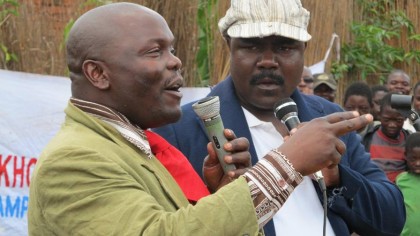 The project has taken a novel approach to recruiting participants by staging a two-week awareness campaign that incorporates comedy, music, and film. The group has engaged the services of popular local comedians Chindime and Samalani and the Health Education Band of the Ministry of Health. VMMC promotional film documentaries will also be shown.
The project has taken a novel approach to recruiting participants by staging a two-week awareness campaign that incorporates comedy, music, and film. The group has engaged the services of popular local comedians Chindime and Samalani and the Health Education Band of the Ministry of Health. VMMC promotional film documentaries will also be shown.
Local leaders are also getting in on the act. Encouraging his subjects following a VMMC promotional documentary, Group Village Headman (GVH) Chimwaye underscored the need to seriously consider VMMC, a one-time intervention scientifically proven to reduce the transmission of HIV by 60 percent.
“Now we have no reason to complain about long distance to town (VMMC Center in old town in Lilongwe),” he said. “VMMC services are within our own vicinity.”
The initiative is in partnership with Lilongwe District Office and Health Education Unit of the Ministry of Health (HEU), and the International Technology and Education Centers for Health (I-TECH) Malawi as part of a PEPFAR subgrant. It is intended to encourage more eligible men to access locally available VMMC services.
New Article On Cost Effectiveness Of Training
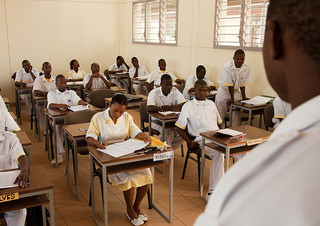 A new article on cost-effectiveness analysis of global training programs has been published in a leading journal on health workforce issues.
A new article on cost-effectiveness analysis of global training programs has been published in a leading journal on health workforce issues.
The article, “Cost-Effectiveness Analyses of Training: A Manager’s Guide,” was written by two I-TECH faculty: Gabrielle O’Malley, who is I-TECH’s Director of Operations Research and Quality Improvement, and Marcia Weaver, a Research Associate Professor based at I-TECH. Elliot Marseille of Health Strategies International in San Francisco also contributed to the article that appears in the journal Human Resources for Health.
The evidence on the cost and cost-effectiveness of global training programs is sparse. O’Malley and Weaver wrote this manager’s guide for professionals who want to recognize and encourage high quality cost-effectiveness analysis.
Weaver credits O’Malley with coming up with the idea for the article and spearheading it through several drafts over several years. In her role at I-TECH, O’Malley participates in meetings with policymakers and sees how compelling evidence on cost-effectiveness can be as well as the potential for cost data to be misinterpreted or misused.
“The objectives of the article are to promote professional standards for cost analyses and cost-effectiveness and show it’s feasible to provide evidence within the scope and budget of a training program evaluation,” Weaver said.
Photo of the Week: Clinical Mentors
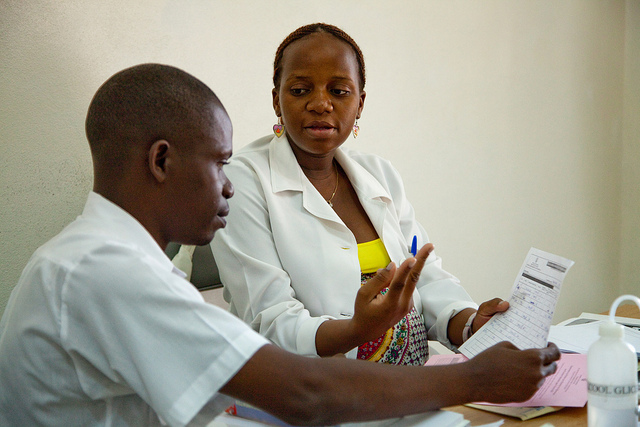
I-TECH clinical mentors work to strengthen the provision of care for people living with HIV and AIDS, tuberculosis (TB), and sexually transmitted infections (STI) by assessing and making recommendations for improvements to service-delivery systems.
I-TECH Releases Updated Manual on Essential Supervisory Skills
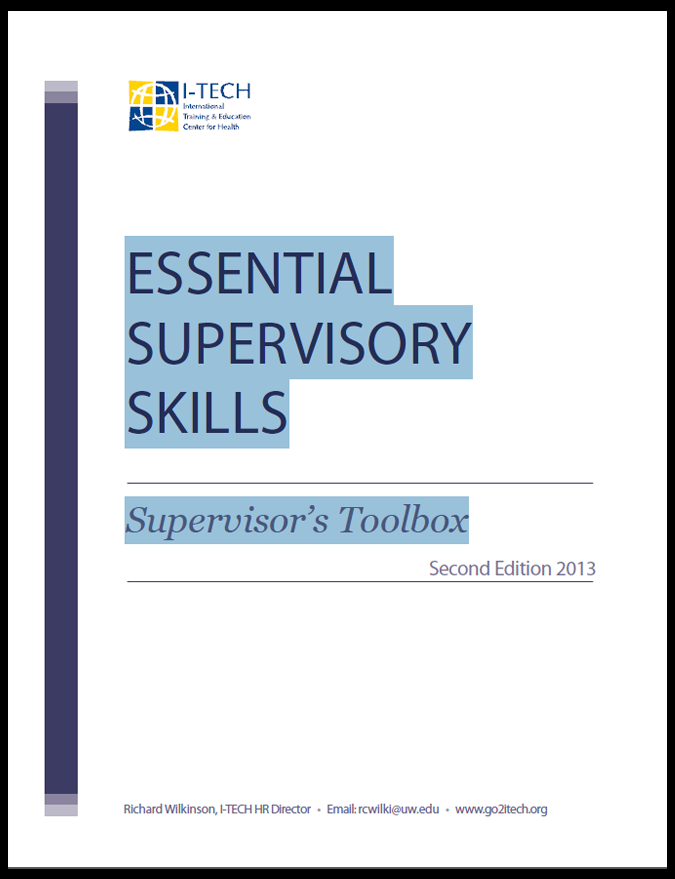 The International Training and Education Center for Health (I-TECH) is pleased to announce the release of the second edition of I-TECH’s manual Essential Supervisory Skills, which you can download here (PDF, 2.7 MB).
The International Training and Education Center for Health (I-TECH) is pleased to announce the release of the second edition of I-TECH’s manual Essential Supervisory Skills, which you can download here (PDF, 2.7 MB).
A resource for managers, this “supervisor’s toolbox” is a 65-page manual developed from years of research and discussions with supervisors in a variety of industries from several countries. This easy-to-use guide gives managers a step-by-step plan to develop their supervisory skills while helping their employees reach their potential. Seven chapters include background and instructions on accountability, evaluation, effective hiring and how to address performance issues.
“The purpose of the Supervisor’s Toolbox is to provide a convenient resource supervisors can turn to when dealing with the myriad of issues that come their way,” said Richard Wilkinson, I-TECH Human Resources Director.
Decisions supervisors make often have a direct impact on employees’ lives—and global health. Wilkinson points out that investing in training for supervisors translates to more effective, efficient, and happier employees.
“There’s an old saying that employees join organizations and leave bosses,” he said. “Supervisors directly affect the difference employees can make in contributing to the success of their teams and I-TECH. My hope is these tools will help supervisors communicate clearly and manage confidently.”
New Tuberculosis Facility in Ethiopia Unveiled
Report by Yonathan Alemu
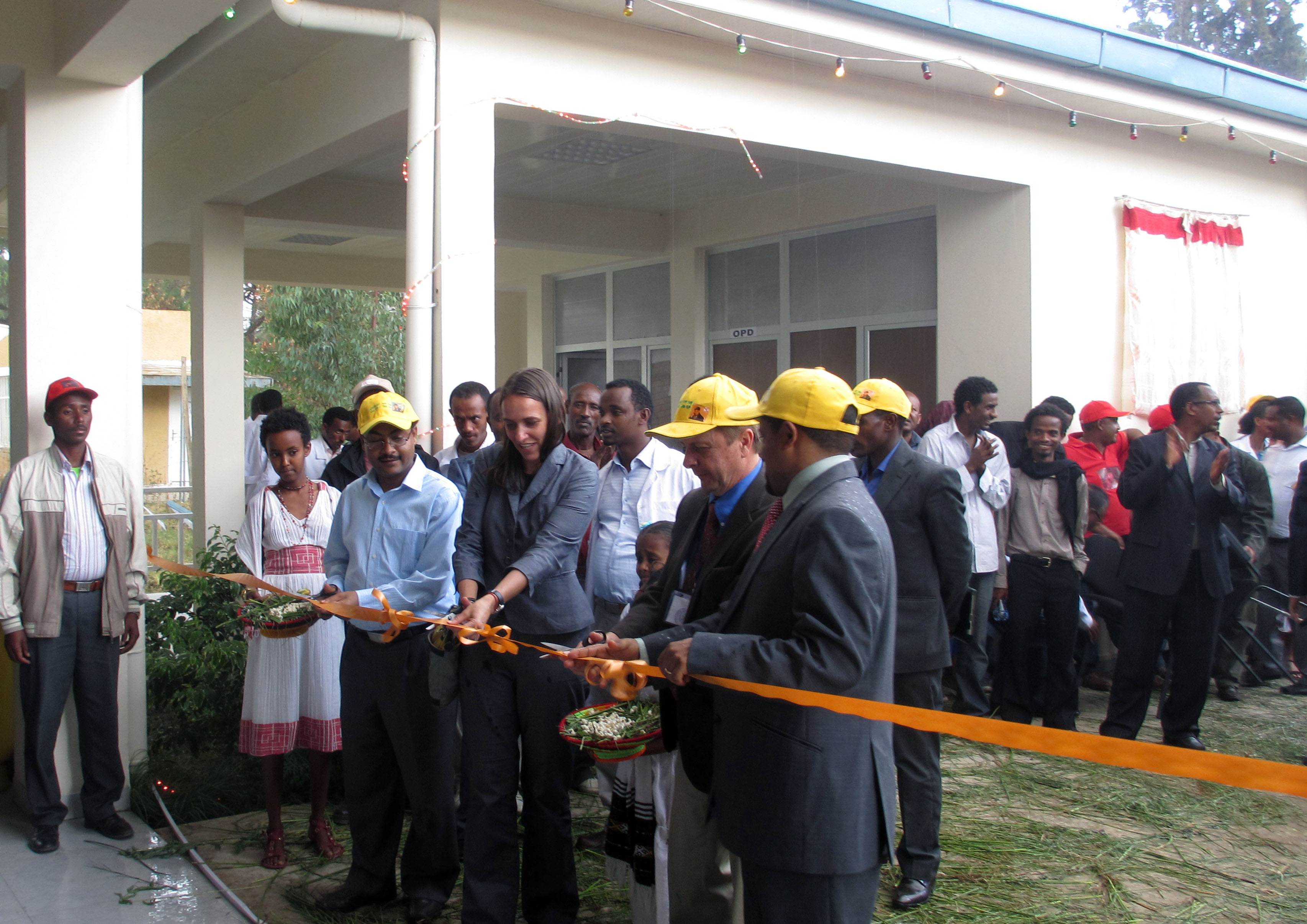 A state-of-the-art tuberculosis (TB) facility in Ethiopia is a new weapon in the country’s battle against the disease.
A state-of-the-art tuberculosis (TB) facility in Ethiopia is a new weapon in the country’s battle against the disease.
Located at the Mekelle Hospital in the Tigray region, the facility features a TB isolation ward with a multiple-drug resistant TB unit. The ward was constructed by International Training and Education Center for Health (I-TECH) Ethiopia with funding from the United States government. It is one of three such facilities in the country.
Resource-limited countries like Ethiopia struggle to address the growing demand for health care services. TB and MDR-TB are major public health problems with the highest mortality rate of any disease in the country. Ethiopia ranks seventh out of the 22 highest TB-burden countries. MDR-TB is a particularly threatening infection—it is difficult to diagnose without the proper technology. It is also difficult to treat, often requiring patients to stay on medication for two years.
The facility is in response to the urgency of implementing standardized TB prevention and the Federal Ministry of Health’s prioritized scale-up program.
The new TB facility enables the hospital—which had to refer such cases to the capital Addis Ababa—to separately treat TB and MDR-TB patients from other patients and thereby significantly reduce the risk of cross-infection. With a maximum capacity of 35 beds, the facility is able to provide scores of services, including first-rate TB case management, TB treatment, and support and community follow-up systems. It will also serve as a training center to help prevent and control the spread of TB in the region.
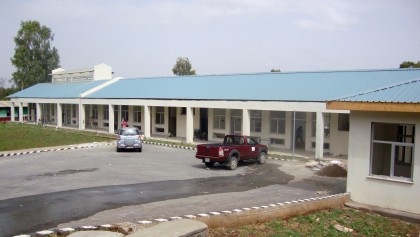 The facility was inaugurated on April 4, 2013. In a ribbon-cutting ceremony, I-TECH Ethiopia officially handed over the well-equipped and furnished facility. Dr. Kesete-Berhan Adamssu, Minister of Ministry of Health, acknowledged the support and strong commitment of CDC and I-TECH Ethiopia in their contribution to the country’s health system development endeavor. He emphasized that the facility will improve and expand TB diagnostic services and screening in rural areas and among HIV positive residents.
The facility was inaugurated on April 4, 2013. In a ribbon-cutting ceremony, I-TECH Ethiopia officially handed over the well-equipped and furnished facility. Dr. Kesete-Berhan Adamssu, Minister of Ministry of Health, acknowledged the support and strong commitment of CDC and I-TECH Ethiopia in their contribution to the country’s health system development endeavor. He emphasized that the facility will improve and expand TB diagnostic services and screening in rural areas and among HIV positive residents.
During the ceremony, a female patient sat quietly in a doorway at the far end of the ward, intently watching the program. Haimanot, (whose name is changed for this report) is in a segregated section of the ward, designed for patients with MDR-TB. She is a 22-year-old single mother of two admitted three weeks ago. She is in a very frail state as she has been living with the MDR-TB for a long time. “Besides, what is more worrying is the status of her two teens as they were living with her in a very small flat which allows them the cross-contamination,” said the TB nurse treating her.
The nurse said that Haimanot’s story is common, particularly in the rural areas of the region. Follow-up in communities with these cases is critical to preventing this deadly and quick-spreading infection.
For a hospital serving more than four million where TB infection is rampant, this facility will play a substantial role in the fight against tuberculosis. It could save countless lives through the scale up of MDR-TB diagnosis, management, and follow-up of patients.
Present at the transfer were several dignitaries and high-level officials, including H.E Dr. Keseteberhan Admassu, Minister of the Ministry of Health; H.E. Hagos Godefy, Tigray Region health bureau head; Dr. Thomas Kenyon, CDC Ethiopia Country Director; and Misti Mc.Dowell, I-TECH Ethiopia Country Director. Also present were representatives from the Mekelle University and regional health bureaus.
Dr King Holmes Wins Gairdner Foundation’s 2013 Global Health Award
 I-TECH’s founding principal investigator Dr King Holmes has been awarded the Gairdner Foundation’s 2013 Global Health Award for his scientific contributions to the field of sexually transmitted diseases. Holmes holds the William H. Foege Endowed Chair in Global Health at the UW Department of Global Health, where I-TECH is based, and has led I-TECH since its inception.
I-TECH’s founding principal investigator Dr King Holmes has been awarded the Gairdner Foundation’s 2013 Global Health Award for his scientific contributions to the field of sexually transmitted diseases. Holmes holds the William H. Foege Endowed Chair in Global Health at the UW Department of Global Health, where I-TECH is based, and has led I-TECH since its inception.
The award recognizes “a scientist whose research has made, or has the potential to make, a significant impact on health in the developing world.” The Foundation notes that “King has spent 45 years researching sexually transmitted diseases. His work has led to many diagnostic tests and therapies for treating and preventing numerous infections, including human papilloma virus, gonorrhea, chlamydia and genital herpes.”
Announcing the award in an e-mail to the UW School of Public Health, Dean Howard Frumkin wrote, “King has been a force of nature here at UW, as a longtime leader in the School of Medicine, and more recently as Chair of Global Health—a leader in education, in research, and in program-building, a mentor and role model to many, a true gentleman, and a friend. Please join me in congratulating him on this signal, and richly deserved, honor.”
Read more in The Lancet’s coverage of the announcement, and the Gairdner Foundation’s announcement.